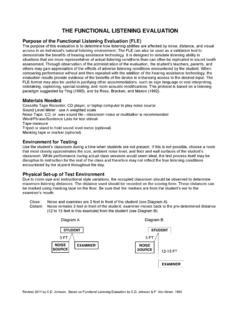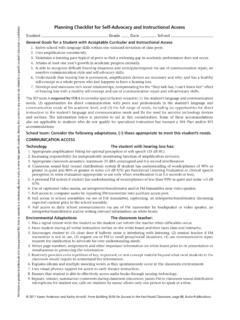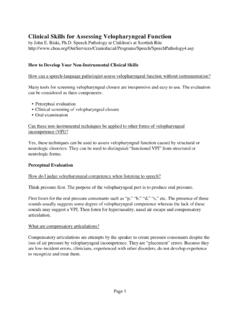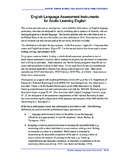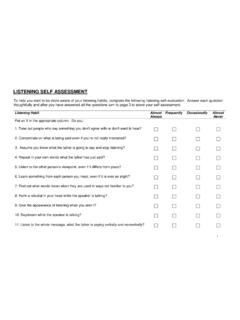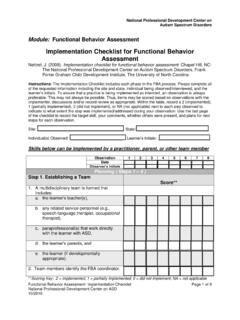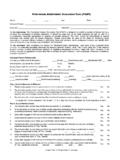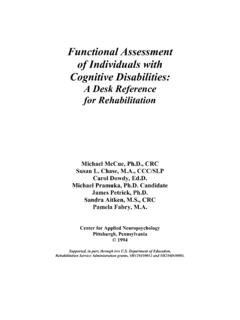Transcription of Decisions on Functional Skills reform
1 Decisions on Functional Skills reform Decisions on rules and guidance for new Functional Skills Qualifications in English and mathematics June 2018 Ofqual/18/6385/2 Decisions on Functional Skills reform 1 Contents Introduction .. 2 Overview of our Decisions .. 2 Assuring the approach to assessment .. 3 Assessment strategies .. 3 Technical evaluation .. 3 Design rules all new Functional Skills Qualifications .. 5 Subject content .. 5 Assessment time requirements .. 6 Setting, contextualising and marking assessments .. 7 Assessment availability .. 7 Grading .. 8 Subject-specific features English .. 9 Qualification structure .. 9 Assessing reading and spelling at the Entry levels .. 9 Spelling, punctuation and grammar .. 10 Assessment of speaking, listening and communicating .. 11 Monitoring speaking, listening and communicating assessments.
2 12 Subject-specific features mathematics .. 15 Number of assessments .. 15 Coverage of subject content .. 16 Weightings for calculator- and non-calculator based mathematics .. 16 Weightings for underpinning Skills and problem solving .. 18 Setting and maintaining standards .. 19 Evidence used in setting specified levels of attainment .. 19 Impact of our proposals .. 21 Regulatory impact .. 21 Equality impact .. 22 Next steps .. 27 Decisions on Functional Skills reform 2 Introduction Functional Skills Qualifications (FSQs) in English and mathematics are being reformed. New FSQs in English and mathematics will be introduced for first teaching in September 2019. The Department for Education has previously consulted on and published subject content that will apply to the new FSQs in English1 and We have also previously consulted on and confirmed our overall approach3 to regulating new FSQs in English and mathematics.
3 We consulted on the details rules and guidance that would implement those Decisions between 28 March 2018 and 11 May 2018. This document sets out our final Decisions on those rules and guidance. Overview of our Decisions In response to consultation feedback, we have: increased the weighting of spelling, punctuation and grammar in English to 40-45% at levels 1 and 2, and 50-70% at the Entry levels revised our approach to monitoring of speaking, listening and communicating assessments to focus on the assurance awarding organisations must obtain, without prescribing a particular approach to assurance amended our proposed Conditions and guidance in a number of places to deal with concerns raised by respondents, for example we have: - made minor changes to our assessment criteria for speaking, listening and communicating - revised our proposed rules on issuing results and certificates to make our expectations clearer - revised our rules on standard setting to make them simpler and clearer, and to reflect the different information that will be available to awarding organisations at the different qualification levels We have adopted all our other proposals unchanged.
4 1 2 3 Decisions on Functional Skills reform 3 Assuring the approach to assessment Assessment strategies Consultation proposals We proposed to require awarding organisations to: establish, maintain, comply with and keep under review an assessment strategy for each new FSQ they offer ensure their assessment strategy sets out how they will comply, on an ongoing basis, with all the rules that apply to new FSQs include in their assessment strategies information and evidence covering their overall approach to assessment including how they intend to design, develop and deliver the qualifications as well as their approaches to centre assessment and moderation, and standard setting and maintenance review their assessment strategy when we ask them to, and make any changes we request to it, and to how they comply with it Responses received Most respondents supported our proposed approach to assessment strategies, noting it would improve standards across awarding organisations.
5 And ensure a consistent approach to assessment. Two respondents raised minor concerns about this aspect of our proposals: one questioned whether it was necessary for assessment strategies to detail organisation-level approaches to compliance with our rules; the other queried whether there would be a right of appeal against a decision to require changes to an assessment strategy. Decision Based on the overall support for our proposals, we have decided to adopt them unchanged. Our view is that it is appropriate for assessment strategies to explain how, in the particular context of reformed FSQs, an awarding organisation will secure compliance with all relevant obligations. We have taken the decision not to introduce an appeals process within the assessment strategy condition. We do not have such a provision within the similar Condition for GCSEs and A levels, and there are already established processes for appealing the regulator s decision.
6 Decisions on Functional Skills reform 4 Technical evaluation Consultation proposals We proposed to require awarding organisations to: notify us at an early stage that they intend to make any new FSQ available; provide us with any information we request to support our evaluation of the qualification wait for us to communicate the outcome of our evaluation before making the new FSQs available make any changes we require to their assessment approach, which, depending on the exact nature of the changes required, could be needed before or after they make the qualification available Responses received On the whole, respondents agreed with our proposed approach and requirements for technical evaluation , stating the approach was sensible and logical, further improving comparability. A number of awarding organisations did, however, comment that more detail was required around the process, including the information we would require them to submit as part of the technical evaluation process.
7 Decision Based on the overall support for our proposals, we have decided to adopt them unchanged. We continue to work directly with awarding organisations to develop the detail of the process for technical evaluation , and to clarify our information requirements. Decisions on Functional Skills reform 5 Design rules all new Functional Skills Qualifications Subject content Consultation proposals We proposed guidance on interpreting the subject content which would: set out our general expectation that, in both subjects, content statements should be assessed in a way that reflects the level of the qualification, and therefore that expectations of learners will be different at each level, even when content statements are similar for English, clarify how awarding organisations should approach the terms for example and including where these are used in the subject content, and how they should reflect the scope of study statements in assessments for mathematics, clarify how awarding organisations should approach problem solving, and how they should assess underpinning Skills in questions/tasks that use a context Responses received Overall, respondents supported our approach of issuing guidance to clarify the subject content.
8 However, a number of respondents suggested that we could provide additional guidance to help ensure awarding organisations take a more consistent approach to assessment. A number of respondents also commented on the use of non-calculator assessment in mathematics, and the removal of spelling and grammar checks in English. We have considered these comments under the appropriate sections below. Decision We have reviewed the specific areas where awarding organisations requested additional guidance. In each case, our view is that the concerns raised reflect either disagreements with, or misinterpretations of, aspects of the subject content itself. As such, it would be inappropriate for us to provide guidance of the type requested, as this would not then reflect the Department for Education s subject content requirements. Decisions on Functional Skills reform 6 Assessment time requirements Consultation proposals We proposed minimum and maximum overall assessment times: Minimum times Maximum times Proposed Change from current Proposed Change from current English Levels 1 and 2 2 hrs n/a 3 hrs n/a English Entry levels 1hr 30 mins +30 mins 2 hrs n/a Mathematics Levels 1 and 2 1hr 45 mins +15 mins 2 hrs 30 mins +30 mins Mathematics Entry levels 1hr 15 mins +15 mins 1 hr 45 mins +15 mins Responses received The majority of respondents commented that our proposed overall assessment times were appropriate.
9 A small number suggested that the times seemed too long (particularly at the Entry levels), and one respondent said they would prefer longer assessment times in mathematics at Levels 1 and 2. Three respondents also commented that we should specify a fixed duration for all assessments. Decision Overall, we remain of the view that the modest increases in assessment time we proposed are appropriate given the changes in the subject content. Particular concerns were raised in respect of the increases at the Entry levels, but we think these increases are justified as a result of the introduction of specific reading and spelling expectations in Entry level English, and non-calculator based assessment in mathematics. We are also not persuaded that we should set fixed assessment times. This is because the appropriate length for an assessment will depend on how an awarding organisation chooses to construct its assessments, and there are different ways they might do that.
10 We have therefore decided to adopt our consultation proposals unchanged. Decisions on Functional Skills reform 7 Setting, contextualising and marking assessments Consultation proposals We proposed rules: specifying how centres could adapt assessments at the Entry levels; and requiring awarding organisations to provide guidance to centres around any setting, adaptation, delivery or marking of assessments that they undertake. Responses received Overall, respondents agreed with our proposal to specify how centres could adapt assessment at the Entry levels and the requirement for awarding organisations to provide guidance to centres around any setting, adaptation, delivery or marking of assessments. Decision Based on the overall support for our proposals, we have decided to adopt them unchanged. Assessment availability Consultation proposal We proposed to introduce guidance on assessment availability.










